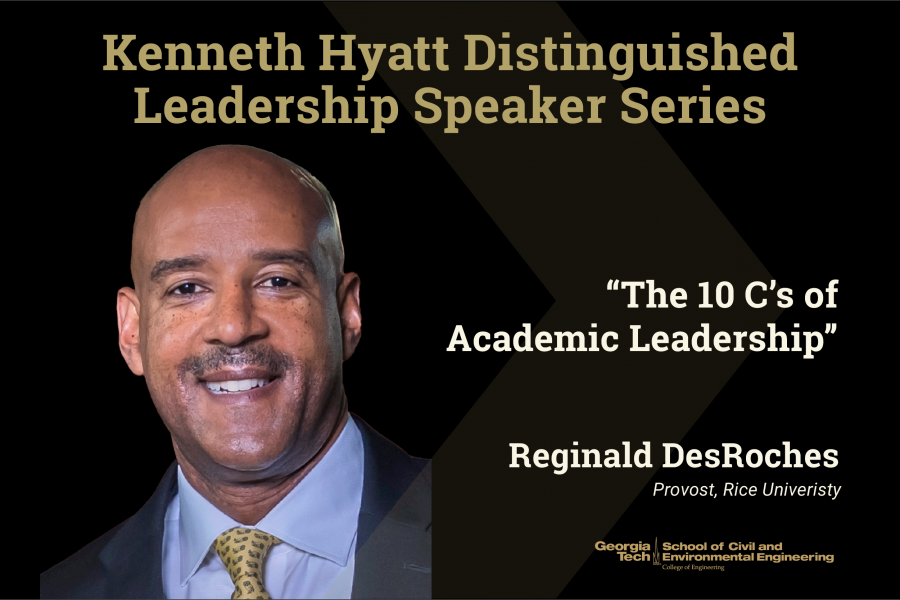
In more than 30 years in academia, Reginald DesRoches has learned a lot about leadership.
As the provost of Rice University, he is the chief academic officer—a role that’s often an arbiter between the interests of a university’s faculty and administration.
“It’s a very difficult position at a university. This has been the most challenging leadership and administration position I’ve had,” DesRoches said.
As the Spring 2021 speaker for the Kenneth Hyatt Distinguished Leadership Speakers Series, DesRoches shared his life story and career journey into academic leadership with a virtual Georgia Tech audience on Feb. 23.
DesRoches was born in Haiti, and raised in New York City, to which he attributes a lifelong influence.
“It taught me to be resilient and to be tough – that’s my leadership style and how I approach things,” DesRoches said.
He moved to the west coast to attend college at the University of California, Berkeley, where he studied mechanical engineering. He shifted course in 1989 after a major earthquake in the Bay Area sparked his interest in earthquakes and structural engineering. He went on to earn his Ph.D. in structural engineering and joined the faculty of Georgia Tech in 1998.
His career choice proved to be a good fit. He enjoyed the research and found working with grad students to be especially fulfilling.
“I absolutely loved being a professor,” DesRoches said.
DesRoches is an internationally recognized scholar in earthquake and structural engineering focusing on the design of resilient infrastructure systems under extreme loads and the application of smart materials.
In 2008, he had his first opportunity to serve in a leadership role at Georgia Tech when he was named an associate chair of the School of Civil and Environmental Engineering before going on to the lead the school as the Karen and John Huff School Chair in 2012.
DesRoches served as the key technical leader in the United States’ response to the 2010 Haiti earthquake, taking a team of 28 engineers, architects, city planners and social scientists to study the impact of the earthquake.
DesRoches left Georgia Tech in 2017 to become the Dean of the George R. Brown School of Engineering at Rice University. He was promoted to provost after less than three years as dean of engineering.
Based on his experiences, DesRoches distilled his advice for leaders into “10 C’s of Academic Leadership.”
- Being Connected and Making Connections: Building relationships and trust are essential to being a leader. When he was new at Rice University, DesRoches made it a priority to visit with every faculty member in the College of Engineering. “You have to make the time to build those connections,” DesRoches said.
- Communication: “Right now, it’s become too easy to do things via text and email,” DesRoches said. While Covid-19 has limited our ability to interact, DesRoches believes it’s important to find ways to safely connect with each other in person.
- Collaboration: Especially in academia, people are divided into groups—schools within colleges, affinity groups within schools, etc. “As a leader it’s important to bring people together and foster collaborations across disparate disciplines,” DesRoches said.
- Community Builder: Work hard to build a community of people who enjoy working together and being part of a team. In addition to talent, it is critical to look for people who can contribute to a positive environment.
- Agent of Change: As a leader, you will be hired to make changes in an organization. “You also have to constantly question how you’re doing things yourself,” DesRoches said. “The worst thing you can do as an organization is remain stagnant.”
- Courage: “You’re going to have to take risks, as a researcher and a leader,” DesRoches said. In 2010, he was asked to travel to Haiti less than a week after a massive earthquake. “There were health hazards, security hazards, we didn’t know where we would stay,” DesRoches said. “But I took a risk…it was one of the greatest things I’ve done in my career. I learned a lot about myself and what I can do.”
- Stick to your Core values: As a leader, you will have to make many difficult decisions. Act with purpose and meaning to ensure your decisions align with your values and your mission.
- A Champion for others: Faculty members are focused on competing for grants, awards and recognition. But as a leader, it’s important to put your own interests aside to be a champion for the people on your team.
- Consultative leadership: Engage a broad group of people in the decision-making process. You will learn from people who push back, and may discover there are consequences of your decisions you hadn’t considered.
- Use Carrots more than sticks: As a leader, DesRoches says you can accomplish your goals using “carrots,” —that is, positive reinforcement—a majority of the time. “It’s more effective, and people will appreciate it more,” he said.
Related:
